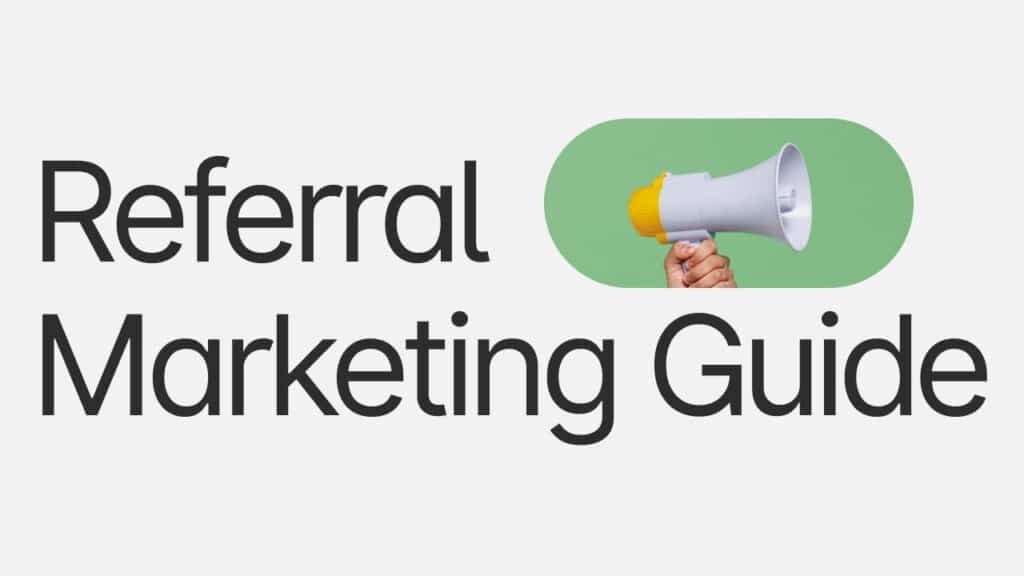Referral marketing is a powerful way to grow your business by leveraging the trust and credibility of your existing customers. When a satisfied customer refers your business to their friends, family, or colleagues, it’s like getting a personal endorsement from someone they know and trust. This can lead to a significant increase in new customers and sales.
In this comprehensive referral marketing guide, we’ll cover everything you need to know to create and implement a successful referral program. We’ll start with the basics of referral marketing and then dive into more advanced topics like creating a referral program, promoting it for maximum impact, and tracking and measuring its success.
Understanding the Basics of Referral Marketing

In the dynamic world of business, staying ahead requires innovative strategies. One such powerful tool is referral marketing, and in this guide, we will delve into the essentials of building a successful referral marketing program.
What is Referral Marketing?
Referral marketing is a strategic approach that leverages the power of word-of-mouth recommendations to attract new customers. At its core, a referral marketing guide is designed to help businesses harness the potential of existing customers to drive new leads and boost sales.
1. Creating a Referral Marketing Guide: A well-crafted referral marketing guide serves as the roadmap for businesses aiming to tap into the immense potential of customer referrals. This guide outlines the steps, strategies, and best practices necessary to implement a successful referral program.
2. The Power of a Referral Marketing Guide: A referral marketing guide acts as a comprehensive resource, providing businesses with insights into understanding their target audience, identifying key influencers, and crafting compelling referral incentives. By following the guidelines outlined in a referral marketing guide, businesses can effectively turn satisfied customers into brand advocates.
3. Implementing a Referral Marketing Program: To maximize the benefits of referral marketing, it’s crucial to follow a structured approach outlined in a referral marketing guide. From identifying your most loyal customers to designing attractive incentives, this guide provides a step-by-step process to ensure the successful implementation of a referral program.
4. Measuring Success with a Referral Marketing Guide: Tracking and analyzing the performance of your referral program is a vital aspect covered in a referral marketing guide. By utilizing key performance indicators (KPIs), businesses can gauge the impact of their referral efforts and make informed decisions for continuous improvement.
Referral Marketing Meaning: Building a Referral-Friendly Business
Creating a Referral Program That Works

A referral marketing program is a structured way to encourage and reward customers for referring new customers to your business. By creating a referral marketing program that is easy to understand and participate in, you can increase customer acquisition and grow your business.
Referral Marketing for Small Business Advocates Ambassadors
Steps to Create a Successful Referral Program
- Define Your Goals and Objectives:
- What do you want to achieve with your referral marketing program? Do you want to increase customer acquisition, improve customer loyalty, or generate positive word-of-mouth?
- Once you know your goals, you can tailor your referral marketing program to achieve them.
- Choose the Right Incentives:
- What will motivate your customers to refer your business to others? Common incentives include discounts, free products, cash rewards, or points that can be redeemed for rewards.
- Make sure your incentives are attractive and relevant to your target audience.
- Make It Easy to Refer:
- Ensure that it is easy for customers to refer your business to others. Provide them with referral links, social media sharing buttons, or pre-written referral messages.
- You can also make it easy for customers to refer your business by integrating your referral marketing program with your CRM or e-commerce platform.
- Promote Your Referral Program:
- Once you have created your referral marketing program, you need to promote it to your customers. You can do this through email marketing, social media, or in-store signage.
- Make sure to communicate the benefits of your referral marketing program and how customers can participate.
- Track and Measure Results:
- Monitor the performance of your referral marketing program to see what is working and what is not. Track metrics such as the number of referrals, conversion rate, and customer lifetime value.
- Use this data to make adjustments to your referral marketing program and improve its performance over time.
Referral Marketing Examples: How Top Brands Drive Growth through
Tips for Creating a Successful Referral Program
- Keep it simple: Your referral marketing program should be easy to understand and participate in. Avoid complex rules or requirements.
- Make it rewarding: Offer incentives that are attractive and relevant to your target audience.
- Make it easy to refer: Ensure that it is easy for customers to refer your business to others. Provide them with referral links, social media sharing buttons, or pre-written referral messages.
- Promote your program: Communicate the benefits of your referral marketing program to your customers and make it easy for them to participate.
- Track and measure results: Monitor the performance of your referral marketing program to see what is working and what is not. Use this data to make adjustments and improve its performance over time.
Referral Marketing Trends: What’s New and What’s Next
By following these tips, you can create a successful referral marketing program that will help you attract new customers, grow your business, and improve your bottom line.
Promoting Your Referral Program for Maximum Impact

In the realm of effective marketing strategies, promoting your referral program is a key component for achieving maximum impact. This segment of the referral marketing guide will delve into the essential tactics to ensure your referral program gains the attention it deserves and delivers optimal results.
1. Leveraging the Referral Marketing Guide: To initiate a successful referral marketing campaign, businesses must first turn to their comprehensive referral marketing guide. This guide serves as the foundational document, providing a roadmap for designing and executing promotional strategies that amplify the reach and impact of your referral program.
2. Strategic Communication in Your Referral Marketing Guide: Effectively promoting your referral program requires strategic communication outlined in the referral marketing guide. Craft compelling messages that resonate with your audience, emphasizing the benefits of participation and the value they can unlock by becoming advocates. The guide details how to tailor your communication to different segments, ensuring a personalized and persuasive approach.
3. Utilizing Multiple Channels as per the Referral Marketing Guide: A well-rounded promotional strategy, as directed by the referral marketing guide, involves leveraging multiple channels. Whether it’s through email marketing, social media, or even traditional advertising, the guide provides insights into tailoring your message for each platform. By diversifying your promotional efforts, you increase the visibility of your referral program across various touchpoints.
4. Incentivizing Referrers in Your Referral Marketing Guide: To boost the impact of your referral program, the guide emphasizes the importance of incentivizing referrers. By offering attractive rewards and bonuses, businesses can motivate existing customers to actively participate in spreading the word. The referral marketing guide outlines how to structure incentives effectively to ensure they align with your business goals and resonate with your audience.
5. Measuring and Adjusting in Your Referral Marketing Guide: The guide also emphasizes the need for continuous assessment and adjustment. By tracking the performance of your promotional efforts, you can identify what works best for your audience. This iterative approach, detailed in the referral marketing guide, allows businesses to refine their promotional strategies for ongoing success.
My Lifestyle Multilevel Marketing: 10 Tips for a Successful Business
Tracking and Measuring the Success of Your Referral Program

Tracking and measuring the success of your referral marketing program is essential to ensure that it is meeting your goals and objectives. By monitoring key metrics, you can identify what is working and what is not, and make adjustments to improve the performance of your program over time.
Referral Marketing Sites: Your Guide to Tailored Solutions and Success
Metrics to Track
There are a number of metrics that you can track to measure the success of your referral marketing program, including:
- Number of referrals: This metric measures the total number of customers who have referred new customers to your business.
- Conversion rate: This metric measures the percentage of referred customers who make a purchase or take a desired action.
- Customer lifetime value: This metric measures the total amount of revenue that a referred customer generates over their lifetime.
- Return on investment (ROI): This metric measures the amount of revenue that your referral marketing program generates compared to the cost of running the program.
How to Track Your Metrics
There are a number of ways to track the metrics for your referral marketing program, including:
- Referral tracking software: There are a number of software platforms available that can help you track the performance of your referral marketing program. These platforms can track metrics such as the number of referrals, conversion rate, and customer lifetime value.
- Google Analytics: Google Analytics can be used to track the performance of your referral marketing program by tracking referral traffic and conversions.
- CRM system: Your CRM system can be used to track the number of referrals and conversion rate for your referral marketing program.
Using Data to Improve Your Referral Program
Once you have tracked and measured the performance of your referral marketing program, you can use this data to identify areas for improvement. For example, if you find that your conversion rate is low, you may need to offer more attractive incentives or make it easier for customers to refer your business.
By tracking and measuring the success of your referral marketing program, you can ensure that it is meeting your goals and objectives, and make adjustments to improve its performance over time.
My Lifestyle Business Product: The Ultimate Guide to Success

